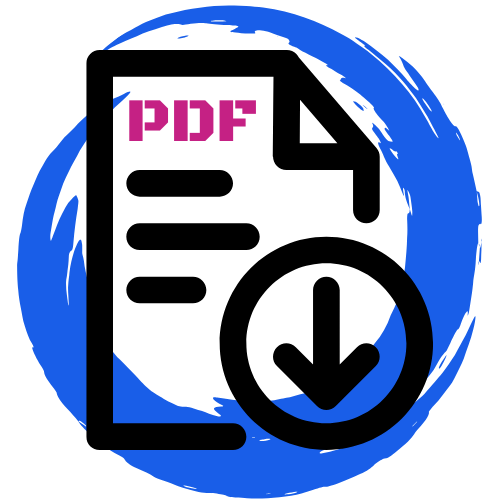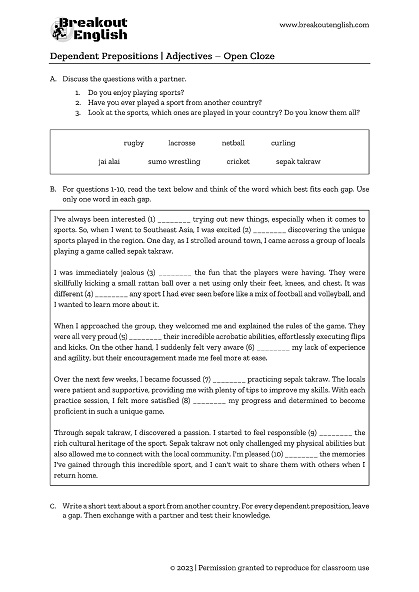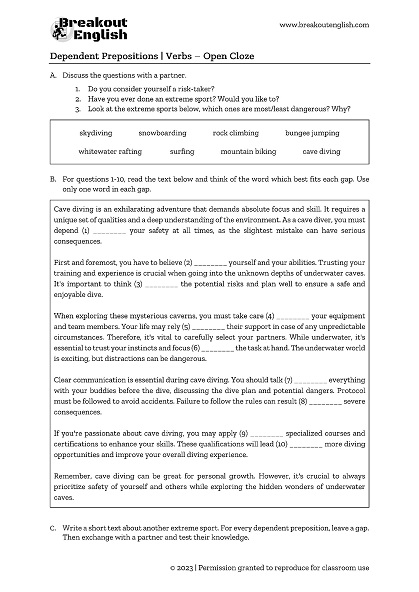Dependent prepositions exercises are a pain in the neck for many who are preparing for a Cambridge exam. Prepositions pop up all over the place in Cambridge exams, especially in Use of English Part 2, the open cloze task, whether it is B2 or C1 level. While we often focus on phrasal verbs, which include prepositions of their own, we can easily forget to focus on dependent prepositions. However, they are often even more difficult to learn because they inherently don’t have any meaning by themselves. These tips and following downloadable dependent prepositions exercises are designed to help focus your attention on the details and hopefully save a few points in your exam.

Contents
What are dependent prepositions?
Dependent prepositions are prepositions which follow certain verbs, adjectives and nouns. They connect the previous word with the following part of the phrase. With other prepositions such as time, place or movement, there is either an underlying meaning connected to the word or a nice rule to follow (e.g. we always use on before a day – He goes to the gym on Monday). However, with dependent prepositions, there are no rules. Simply put, some verbs, adjectives and nouns need a preposition. This preposition is normally fixed and unchangeable. Without it, the sentence is incorrect.
Language learners often struggle with prepositions because they are completely functional language. There is no meaningful content to learn. This means that when you encounter a preposition while reading or listening, your brain can essentially skip over it and still understand the message perfectly. It’s only with active, detailed reading and listening that you notice the language. Here is a short list of common dependent prepositions, many of which are challenging for English language learners.
| Dependent prepositions – Adjectives | Dependent prepositions – Verbs | Dependent prepositions – Nouns |
| interested in | depend on | lack of |
| fond of | participate in | solution to |
| responsible for | lead to | concern about |
| good at | rely on | knowledge of |
| similar to | believe in | access to |
Why are dependent prepositions important for Cambridge exams?
Dependent prepositions are essential in all levels of Cambridge exams. Their importance is especially noticeable at B2 First (FCE) level, when students have a good grasp of the language, but sometimes struggle with accuracy. They continue to be important at C1 and even C2 levels with less frequent vocabulary.
You are most likely to find dependent prepositions in Use of English Part 2, the open cloze task. In this task, you have to complete a series of gaps with only one word. What better word for Cambridge to choose than a dependent proposition? They are also very important in Use of English Part 4, key word transformations. In this part of the exam, you may have to use a specific word or phrase that needs a preposition. If you forget the preposition or use the wrong one, you can easily lose a point.

How to teach dependent prepositions
It can be a challenge to make students notice dependent prepositions. It can be even more of a challenge to remember them. Your students’ first language will no doubt have an enormous influence. In that language, the prepositions may not be directly translatable, they may use a different preposition with a certain word, or no preposition at all. So what can you do to make it stick? Here are a few techniques that I have tried over the years:
- Error correction – This is top of the list because students will make mistakes with prepositions and every time they do, they should be corrected. Make sure to switch up your style of error correction so it doesn’t get stale. If you aren’t insisting on accuracy, you are doing a disservice to your students.
- Gap fills – I know it’s boring and overused, but doing gap-fill exercises like the ones below forces students to focus on the target language. Rinse and repeat and repeat and repeat.
- Vocabulary lists – After error correction, a gap fill or any other task, get students to write down the vocabulary in a notebook. They can have a section for dependent prepositions, split into adjectives, verbs and nouns. They should write down the full chunk of language (e.g. depend on). Then they should write an example sentence, making it true for them if possible.
- Chat cards – Make dependent prepositions exercises more communicative by making chat cards. You can write these yourself or do them together in class. Use them as a warmer, filler or cooler to spice up a potentially dull language point.
Materials
Here are three open cloze texts, similar to Use of English Part 2, to practise dependent prepositions. With these dependent prepositions exercises, you can test your knowledge. Each one is focussed on a different topic related to sports and leisure, each with a short communicative introduction and an optional writing task to extend. Use them together in one big prepositions lesson, or split them up.
EXAM PART: Use of English Part 2 – Open Cloze
EXAM SKILLS: Awareness and control of grammar and vocabulary
TOPIC: Sports
- Dependent prepositions adjectives – Sports from around the world
- Dependent prepositions verbs – Extreme sports
- Dependent prepositions nouns – Sports vs games
TIME: 20-30 minutes per task + extension
PREPARATION: One copy of the worksheet per student
Download






